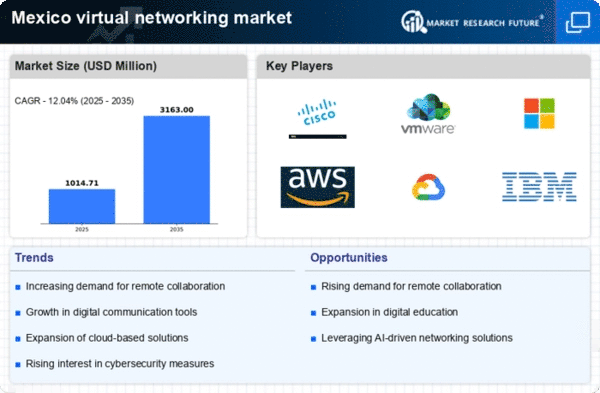Emergence of 5G Technology
The advent of 5G technology is poised to revolutionize the virtual networking market in Mexico. With its promise of faster speeds and lower latency, 5G is expected to enhance the performance of virtual networking solutions significantly. This technological advancement could facilitate more efficient data transmission and improve the overall user experience. As telecommunications companies roll out 5G networks, businesses are likely to leverage this technology to optimize their virtual networking capabilities. The virtual networking market may see a surge in demand for solutions that can harness the benefits of 5G, enabling organizations to operate more effectively in a digital-first environment. The potential for 5G to transform networking practices suggests a dynamic future for the virtual networking market in Mexico.
Increased Focus on Cost Efficiency
Cost efficiency remains a critical driver for the virtual networking market in Mexico. Businesses are continually seeking ways to optimize their operational expenditures, and virtual networking solutions offer a viable pathway to achieve this goal. By transitioning to virtual networking, companies can reduce the costs associated with traditional networking infrastructure, such as hardware and maintenance. Recent studies suggest that organizations can save up to 30% on networking expenses by adopting virtual solutions. This financial incentive is particularly appealing to small and medium-sized enterprises (SMEs) in Mexico, which often operate with limited budgets. Consequently, the virtual networking market is likely to witness increased adoption as businesses prioritize cost-effective solutions that do not compromise on performance or security.
Growing Importance of Data Security
As the virtual networking market in Mexico evolves, the importance of data security has become increasingly pronounced. With the rise of cyber threats, organizations are compelled to invest in secure networking solutions to protect sensitive information. Recent statistics indicate that cyberattacks have surged by 40% in the region, prompting businesses to prioritize cybersecurity measures within their virtual networking strategies. This heightened focus on data security is likely to drive demand for advanced virtual networking solutions that incorporate robust security features. The virtual networking market is thus positioned to benefit from this trend, as companies seek to implement secure networking practices that safeguard their data and maintain customer trust. As security concerns continue to escalate, the market is expected to adapt and innovate to meet these challenges.
Rising Demand for Remote Work Solutions
The virtual networking market in Mexico is experiencing a notable surge in demand for remote work solutions. As organizations increasingly adopt flexible work arrangements, the need for reliable virtual networking tools has become paramount. According to recent data, approximately 60% of companies in Mexico have implemented remote work policies, driving the necessity for robust virtual networking infrastructure. This shift not only enhances productivity but also fosters collaboration among geographically dispersed teams. The virtual networking market is thus positioned to benefit from this trend, as businesses seek to invest in technologies that facilitate seamless communication and connectivity. Furthermore, the growing acceptance of remote work is likely to sustain this demand, indicating a long-term growth trajectory for the virtual networking market in Mexico.
Expansion of Digital Transformation Initiatives
Digital transformation initiatives are gaining momentum across various sectors in Mexico, significantly impacting the virtual networking market. Organizations are increasingly recognizing the importance of integrating digital technologies to enhance operational efficiency and customer engagement. A report indicates that over 70% of Mexican enterprises are prioritizing digital transformation, which inherently requires advanced virtual networking solutions. This trend is likely to drive investments in cloud-based networking services, enabling businesses to streamline processes and improve service delivery. The virtual networking market stands to gain from this expansion, as companies seek to leverage innovative networking solutions to support their digital strategies. As digital transformation continues to evolve, the demand for sophisticated virtual networking tools is expected to rise, further solidifying the market's growth prospects.
















